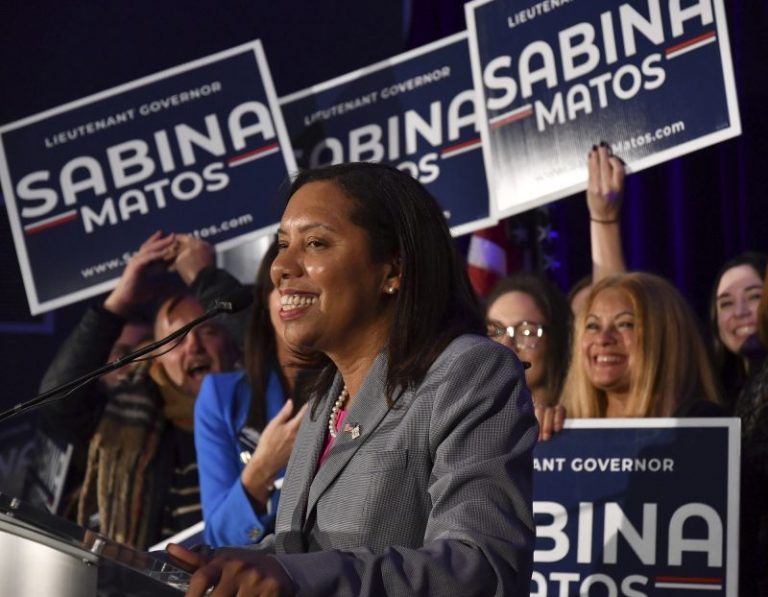Rep. David N. Cicilline (R.I.) took the Democratic Party by surprise when he announced in February that he would leave his House seat to run Rhode Island’s largest philanthropic organization.
Shortly afterward, more than 20 Democrats filed to run for his seat. On Tuesday, 12 of them will appear on the ballot in what has become a turbulent special primary in the state’s 1st District. Of those, three have managed to command the most attention during the race: Lt. Gov. Sabina Matos, former Biden White House aide Gabriel Amo and former state representative Aaron Regunberg.
In deeply blue Rhode Island, the race in this district has become a case study of factions within the Democratic Party — and of how controversies can make or break a campaign.
Matos, the first Dominican American elected to statewide office in the country and the first Black woman to hold statewide office in Rhode Island, is running with the backing of the campaign arm of the Congressional Hispanic Caucus.
Amo has the endorsement of the Congressional Black Caucus, President Biden’s former chief of staff Ron Klain and, most notably, former Rhode Island congressman Patrick Kennedy, who held the seat for 16 years.
And Regunberg is running as a progressive candidate with the backing of Sen. Bernie Sanders (I-Vt.) and Rep. Alexandria Ocasio-Cortez (D-N.Y.), stalwarts of the party’s left wing.
Whoever prevails in Tuesday’s primary will be heavily favored in the November general election.
While Matos appeared to be the early front-runner in the race, that changed in July when her campaign came under scrutiny after filing nomination papers that included the signatures of dead residents and of residents who said they never signed the documents.
The issue drew rebukes from her fellow candidates and sparked an ongoing investigation from the state’s Board of Elections. Still, Matos qualified to be on the ballot after the board determined that 728 of the signatures on the nominating documents were valid out of 1,256 submitted. Per Rhode Island law, candidates need 500 signatures to be on the ballot.
Speaking to reporters in July, the lieutenant governor said she wouldn’t drop out of the race and blamed the canvassing issues on a third-party vendor.
Meanwhile, the campaigns of Regunberg and Amo surged in popularity, to the point where Democratic political strategist Rich Luchette, a veteran of Rhode Island politics who worked for Cicilline for nearly a decade, said he thinks the race might come down to the two of them.
“Aaron probably has an edge right now,” he said. “Gabe is within striking distance.”
Luchette said he doesn’t expect a big turnout on Tuesday, given that the election comes in an off-cycle year and is being held the day after Labor Day. Most Rhode Islanders, he said, have probably been distracted.
“The timing of the election, with when David resigned, just really created an environment where you had a lot of candidates, but they all had a lot of difficulty getting their messages out, and you really saw that because I don’t think there was a story that really stuck over the summer except for the lieutenant governor’s trouble with petition signatures,” he noted.
Regunberg drew some controversy after WPRI, a local Rhode Island news television station, reported that his father-in-law, a money manager at an investment firm, started a super PAC to help his campaign even though Regunberg said at the outset of the campaign that candidates should not accept money from corporate PACs.
Last month, according to WPRI, Matos filed a complaint with federal regulators over the super PAC, arguing that Regunberg violated campaign finance laws by coordinating with his in-laws. Amo also questioned in a news release whether Regunberg had coordinated with his family on the super PAC.
Regunberg’s campaign has dismissed the accusations, telling WPRI that Matos’s complaint is a “ridiculous and unserious attack.”
Both Matos’s signature issue and Regunberg’s super PAC dilemma were at the center of a heated debate between the candidates last month.
Matos said her campaign was “deceived” by the third-party vendor in charge of collecting signatures. When questioned about the super PAC, Regunberg said he would “gladly join with the other candidates on this stage who have super PACs working on their behalf to say we want an end to all super PACS.”
Joe Caiazzo, a Democratic strategist who has worked on numerous Rhode Island campaigns, said the flash points in the race are largely the result of “unforced errors.”
“It’s not like another campaign is throwing a bomb at somebody,” he said.
Caiazzo said he expects Kennedy’s endorsement of Amo to improve his chances in the race because of the former congressman’s connections to the district. And because Amo is an alum of the Obama and Biden administrations, Caiazzo argued he has a better shot at capturing those Rhode Islanders who he said are “hungry for a Biden Democrat.”
Luchette argued that the race won’t be decided on political ideology, given how blue the state is. Instead, he said, voters will turn out for the candidate who was able to convince them — in the short amount of time they had to mount a campaign — that they will be able to fill Cicilline’s shoes and be in constant communication with constituents.
“He was just as effective as either of the two senators,” Luchette said of Cicilline. “Voters benefited from that, from his influence in D.C. and the work that he did on the ground in Rhode Island, and they’re looking for somebody who — nobody’s going to be able to fill his shoes right away — but somebody who will be able to run an office competently, lead on the issues that are important in their lives.”

